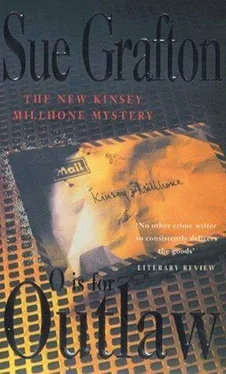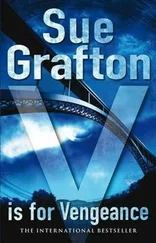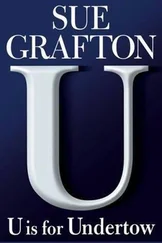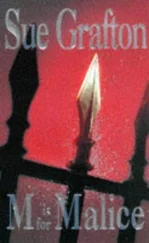I reached in and fumbled among the contents, letting my fingers make the selection among the unfamiliar clusters, a grab bag of the misplaced, the bygone, and the abandoned. The first item I retrieved was a packet of old report cards, bound together with thin white satin ribbon. These, my Aunt Gin had saved for reasons that escaped me. She wasn't sentimental by nature, and the quality of my academic performance was hardly worth preserving. I was a quite average student showing no particular affinity for reading, writing, or arithmetic. I could spell like a champ and I was good at memory games. I liked geography and music and the smell of LePage's paste on black and orange construction paper. Most other aspects of school were terrifying. I hated reciting anything in front of classmates, or being called on perversely when my hand wasn't even raised. The other kids seemed to enjoy the process, while I quaked in my shoes. I threw up almost daily, and when I wasn't sick at school I would try to manufacture some excuse to stay home or go to work with Aunt Gin. Faced with aggression on the part of my classmates, I quickly learned that my most effective defense was to bite the shit out of my opponent. There was nothing quite as satisfying as the sight of my teeth marks in the tender flesh of someone's arm. There are probably individuals today who still bear the wrathful half moon of dental scars.
I sorted through the report cards, all of which were similar and shared a depressingly common theme. Scanning the written comments, I could see that my teachers were given to much hand wringing and dire warnings about my ultimate fate. Though cursed with "potential," I was apparently a child with little to recommend her. According to their notes, I daydreamed, wandered the classroom at will, failed to finish lessons, seldom volunteered an answer, and usually got it wrong when I did.
"Kinsey's bright enough, but she seems absentminded and she has a tendency to focus only on subjects of interest to her. Her copious curiosity is offset by an inclination to mind everybody else's business."
"Kinsey seems to have difficulty telling the truth. She should be evaluated by the school psychologist to determine…"
"Kinsey shows excellent comprehension and mastery of topics that appeal to her, but lacks discipline.."
"Doesn't seem to enjoy team sports. Doesn't cooperate with others on class projects.
"Able to work well on her own."
"Undisciplined. Unruly."
"Timid. Easily upset when reprimanded."
"Given to sudden disappearances when things don't go her way. Leaves classroom without permission."
I studied my young self as though reading about a stranger. My parents had been killed in a car wreck on Memorial Day weekend. I'd turned five on May 5 that year, and they died at the end of that month. In September, I started school, armed with a lunch box, my tablet paper, a fat, red Big Bear pencil, and a lot of gritty determination. From my current vantage point, I can see the pain and confusion I hadn't dared experience back then. Though physically undersized and fearful from day one, I was autonomous, defiant, and as hard as a nut. There was much I admired about the child I had been: the ability to adapt, the resilience, the refusal to conform. These were qualities I still harbored, though perhaps to my detriment. Society values cooperation over independence, obedience over individuality, and niceness above all else.
The next packet contained photos from that same period. In class pictures, I was usually half a head shorter than anyone else in my class. My countenance was dark, my expression solemn and wistful, as if I longed to be gone, which of course I did. While others in the class stared directly at the camera, my attention was inevitably diverted by something taking place on the sidelines. In one photograph, my face was a blur because I'd turned my head to look at someone in the row behind me. Even then, life must have seemed more interesting slightly off-center. What I found unsettling was the fact I hadn't changed much in the years between.
I probably should have been out somewhere looking for new clients instead of allowing myself to be distracted by the past. What could have happened that would result in Mickey's belongings being sold at public auction? Not that it was any of my business, but then again, that's exactly what gave the question its appeal.
I went back to the cardboard box and pulled out an old tape recorder as big as a hardback book. I'd forgotten that old thing, accustomed by now to machines the size of a deck of cards. I could see a tape cassette inside. I pushed the PLAY button. No go. The batteries were probably already dead the day Mickey tossed it in the box with everything else. I opened my desk drawer and took out a fresh pack of C batteries, shoving four, end to end, into the back of the machine. I pushed PLAY again. This time the spindles began to turn and I heard my own voice, some rambling account of the case I was working on at the time. This was like historical data sealed in a cornerstone, meant to be discovered later after everyone was gone.
I turned it off and set the tape machine aside. I reached into the box again. Tucked down along the side, I found ammo for the 9mm Smith amp; Wesson Mickey'd given me for a wedding present. There was no sign of the gun, but I could remember how thrilled I'd been with the gift. The finish on the barrel had been S amp; W blue, and the stock was checked walnut with S amp; W monograms. We'd met in November and married the following August. By then, he'd been a cop for almost sixteen years, while I'd joined the department in May, a mere three months before. I took the gift of a firearm as an indication that he saw me as a colleague, a status he accorded few women in those days. Now I could see there were larger implications. I mean, what kind of guy gives his young bride a semi-automatic on their wedding night? Impulsively, I pulled open my bottom drawer, searching for the old address book where I'd tucked the only forwarding information I'd ever had for him. The phone number had probably been relinquished and reassigned half a dozen times, the address just as long out of date.
I was interrupted by a knock. I hauled my feet off the desk and crossed to the door, peering through the porthole to find my landlord standing on the porch. Henry was wearing long pants for a change, and his expression was distracted as he stared out across the yard. He'd turned eighty-six on Valentine's Day: tall and lean, a man who never actually seemed to age. He and his siblings, who were respectively eighty-eight, eighty-nine, ninety-five, and ninety-six, came from such vigorous genetic stock that I'm inclined to believe they'll never actually "pass." Henry's handsome in the manner of a fine antique, handcrafted and well constructed, exhibiting a polish that suggests close to nine decades of loving use. Henry has always been loyal, outspoken, kind, and generous. He's protective of me in ways that feel strange but are welcome, nonetheless. I opened the door. "Hi, Henry. What are you up to? I haven't seen you for days."
"Thank goodness you're home. I have a dental appointment in" he paused to glance at his watch" approximately sixteen and three-quarter minutes, and both my cars are out of commission. My Chevy's still in the shop after that paint can fell on it, and now I discover the station wagon's dead. Can you give me a lift? Better yet, if you lend me your car, I can save you the trip. This is going to take a while and I hate to tie you up." Henry's five-window butter-yellow 1993 Chevy coupe had suffered some minor damage when several paint cans shuddered off the garage shelf during a cluster of baby earthquakes late in March. Henry's meticulous about the car, keeping it in pristine condition. His second vehicle, the station wagon, he used whenever his Michigan-based sibs came to town.
Читать дальше












